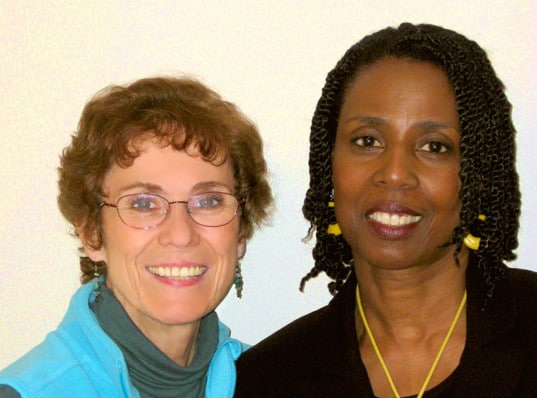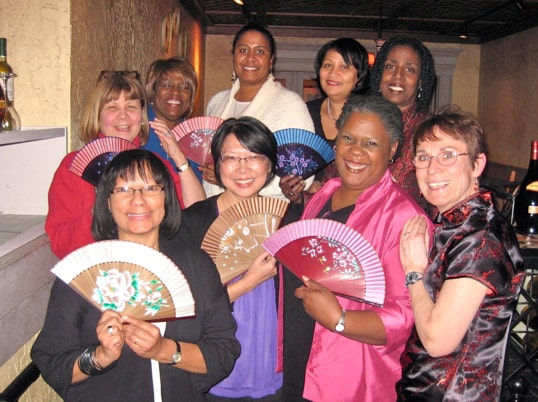It’s been more than ten years since my friend, Dia called me and said, “You’ve got to read this book.” Of course, she was talking about the Yada Yada Prayer Group. Dia has never steered me wrong on a book recommendation, so I went right out to the bookstore and picked up a copy for myself. I was hooked and, as I read the book I thought to myself, “I know this woman!” I kept feeling as if Neta and I were destined to meet in person. Eventually, I sent Neta an email and invited her to come to our church for a women’s retreat. She did, along with her friend Pam, and the rest is history. We hit it off, right away, and we’ve remained friends through the years.
A couple of weeks ago, Neta and I tried to record a video conversation about the book to share with you, but the technology didn’t cooperate. So, we ended up getting caught up on each others’ lives. So, instead of a video conversation to share with you, I sent Neta a list of questions and she graciously answered them all. In the end, I think you’ll really appreciate what she shares with us, here, even though it’s not a video.
What led you to write this book, and how autobiographical is it?
I’d been part of a Bible study group for a couple years that was mixed racially. I was learning so much about walking by faith from these sisters who came from a variety of church backgrounds and life experiences, that I felt like God was using the group to turn my life upside down—or maybe “rightside up.” My husband told me I ought to write a book. I said, “No, no, it’s much too personal. We share confidentially.” He said he meant a novel, a fictionalized story about a group similar to the real group. That’s how The Yada Yada Prayer Group was born. Many of the characters and events were inspired by real people and events, but it’s all been fictionalized.
How do you know so much about so many cultures?
There are a lot of cultures I know very little about! But I’ve been immersed in African-American culture mostly by belonging to churches that are very diverse plus having close relationships with sisters and brothers of color. But some cultures that I include in my novels I have to research!—which is never quite as good as having real relationships with people from other cultures. So I know I make some foot-in-mouth mistakes.
What is the reason you chose to write the book in first person, only from Jodi’s point of view?
Jodi Baxter is not me—but she’s a lot like me. By using first person, I was able to let the reader get inside the main character’s head and see the world from her pretty sheltered, middle-class, white evangelical point of view. Which gave me the opportunity to show how she learns from her often well-intentioned but just as often ignorant mistakes. (Just like me.) You’d be surprised how many readers tell me, “I’m such a Jodi!” Kinda scary how many of us “Jodi’s” are out there in the world, ha ha!
Do you really pray like that? How come my prayers don’t get the same results?
I’m still learning a lot about prayer. I’ve learned a lot from my sisters of color and from other kinds of churches whose worship is more expressive than what I grew up with, but I know I still have much to learn. I especially appreciate learning how to worship God first before launching into my prayer requests for this and that and the other. But sometimes I fall back into the “God, help . . .” or “God please do . . .” type of prayer, skipping over the simple act of praise and thanksgiving. But one of the biggest thing I’m still learning but which is very meaningful to me is to “pray first”—rather than complain first, worry first. This is a biggy for me, because I’m the original worry-wart. Also I’m still learning how to “pray without ceasing”—meaning just praying throughout the day, little short simple prayers: “O God, that sunrise is beautiful! Thank you!” or “That waitress looks like she’s having a bad day. Bless her anyway, Lord.” And it’s becoming easier and easier to just breathe prayers throughout the day.
The book is about friendship and diversity and faith. How do these things work together? How does one enrich the other?
When I was 13, I learned a Christian song that went something like this: “If you know the Lord, you need nobody else, to see you through the darkest night . . . You can walk alone, you only need the Lord . . .” Well, in one sense, I guess that’s true. God is sufficient. BUT that’s not the way God made us! We are ALL part of the Body of Christ, and we need each other for the Body to be complete. As Paul said in 1 Corinthians 12, the “eye” can’t say to the “hand,” “I don’t need you.” And I began to realize the truth of this as I got to know brothers and sisters who weren’t just like me—they enriched my life, they broadened my experience of walking by faith, they had gifts to give me as well as the Church (just as I had gifts to give). But it’s easy to think we are “diverse” if we work or even worship with people who are different than us—but for me, it really comes down to: who do I invite to put their feet under my table? Sharing meals in each other’s homes is much more intimate and you get to really know people underneath the “public” persona. And holding hands and praying around the table . . . so rich. We are so much alike as our brothers and sisters from other cultures . . . and yet we are different enough that we have different experiences and gifts to bring to the friendship (and the church).
Did you have any idea the book would be so successful, and how have you dealt with its success?
The success of that first book took me totally off guard. What?? But I guess it hit a nerve. Women long for intimate relationships with other women, and yet even in our cities and neighborhoods and churches, people feel isolated, unknown, alone. I thought that book would just be one book—but it spawned a whole series, as each character became more “real” and I needed to highlight her story (even though Jodi was still the main character). The main thing that came out of the “success” of the Yada Yada series is that (1) I began hearing from readers that they were starting Yada Yada Prayer Groups all over the U.S., and even in some other countries! THAT was totally unexpected, but such a blessing. And (2) I began to get speaking invitations—but I told the Lord I needed a ministry partner, a woman of color, to go with me if this was something God wanted me to do since my books were about diversity and enlarging our vision of the Body of Christ. So the co-leader of our Bible study, Pam, who is African American, felt God calling her to join me—and we have gone together all across the country and to many different kinds of churches to talk about prayer and worship and sisterhood. The invitations have fallen off pretty much now, though we still do the occasional one, but . . . our Bible study of women is still going strong!
Here’s a picture of Pam and me:

And here’s a picture of our group:

What is something you learned from the book/s?
First of all, I learned that God doesn’t waste any of our life experiences. Even the hard stuff. My purpose in writing The Yada Yada Prayer Group (and all the sequels and other series that have grown out of it) was to share the things God has been teaching ME in a way that other women could identify with—through story. I didn’t (still don’t) feel like an expert in anything, which is why I didn’t write a “how to” book about prayer or worship. I just told a story of a journey, about ordinary, everyday people, with all our ups and downs. And the story led to more stories. Because God keeps teaching me stuff, stuff I want to share with my reader-sisters. Stuff I’m still learning.
And I learned that I have the greatest husband in the world, who has supported me 100%–even taking over the grocery shopping and cooking so I could meet a deadline, even though he’s a writer too and has his own projects he’s working on. I don’t think I could have written 13 novels since 2001 without his constant encouragement. (He found out he loves to grocery shop and cook, and now does those things just because he likes it, ha ha.) BTW, in 2016 we are celebrating our 50th wedding anniversary! Woo hoo!
What is the most important message you’d like us to take away from reading this book?
First, that diversity in the Body of Christ is a great gift—both to the church as a whole, and also to us as individuals. But it takes intentionality to get out of our comfort zones and reach across the dividing walls. But it’s totally worth it!
Second, that we can stretch how we pray and how we worship, we can learn from other cultures and other traditions, which can deepen our relationship with God.
And third, maybe most important, that we don’t have to be perfect on this journey with Jesus. That God’s grace covers our sins and our mistakes and our flaws. It’s such a relief to give up the “good girl, gotta be perfect” image and just be who we are, loved by God, forgiven when we fall—which gives us more grace toward others around us who are also flawed and imperfect and just need to be loved and accepted and forgiven.
 We’ll start a new round of book discussions in March. You’ll want to start making plans to get your hands on a copy of “Between the World and Me” by Ta-Nehisi Coates. Come back next Friday, for details about the book and this next session of the book club, which features a partnership with the Red Couch book club group over at She Loves Magazine. Leigh Kremer and I are working behind the scenes to make this a fun collaboration that I really think you’ll enjoy.
We’ll start a new round of book discussions in March. You’ll want to start making plans to get your hands on a copy of “Between the World and Me” by Ta-Nehisi Coates. Come back next Friday, for details about the book and this next session of the book club, which features a partnership with the Red Couch book club group over at She Loves Magazine. Leigh Kremer and I are working behind the scenes to make this a fun collaboration that I really think you’ll enjoy.
If you participated in this first session of Forward (whether as a vocal participant or a lurker), please take about five minutes to complete this anonymous survey. Your answers will help us shape the book club into something that works well for everyone. Thanks so much!
I think I’m finally ready for the conversation. I got my copy of Coates’ book, too!
Neta, thank you for sharing! I really enjoyed reading. Deidra, thank you for hosting! It’s been very encouraging for me to read together. Something I have truly been dwelling on is, how to make a diverse group happen. I’m control prone so I know that I can’t just make it happen. But this has inspired me to pray harder about opportunities that may be around me that I am not seeing,
And as for reading Between the World and Me, I’m thrilled! A friend and I already bought it to read together, so we may be able to read along together here as well.
Wonderful ! most groups start with humble beginnings thanks for sharing your story!
I love the photo of the book club! It is wonderful to see how God continues to solidify that our sole purpose of living is to worship Him and bring glory to Him. What better way to do that than to embrace all individuals and promote healthy exchanges of forward thinking! I am so grateful to be part of the conversation shared in the Forward Book Club and I am buying ‘Between the World and Me’ right now.
What an enjoyable conversation, and fun to see the photos, too. The Yada Yada prayer group has been an inspiration for me. And now I am praying that I will see how God wants me to be more intentional about helping other women and men learn to pray as a natural part of their day.